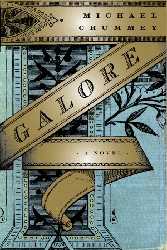by Tori Schacht
Galore is epic; it contains multitudes. A historical novel in the best sense of the term, it’s the antithesis of a stodgy set piece. In writing a novelistic yarn spanning more than one hundred years in wild Newfoundland, the Canadian writer Michael Crummey acts as literary historicist: interrogating the way we internalize time, “remember” the past, and perceive changes in the world and in ourselves. It’s a novel of total fidelity between word and world, the kind of novel that invents its own language, that teaches us how to read it, and that makes our own words feel inadequate.
In Galore, his third novel, Crummey carries readers to Paradise Deep, a fictitious town in coastal Newfoundland “too severe and formidable, too provocative, too extravagant and singular and harrowing to be real.” Galore is stuffed to the gills with the island—its dark ocean reflecting its grey sky, the ice and rain and mud and endless winter—a place so remote and punitive that few traveled there in the period Crummey’s novel occupies, and few do at present.
Crummey’s Paradise Deep, like the town of Macondo in Gabriel Garcia Marquez’s One Hundred Years of Solitude (to which it is frequently compared), exists both in the harsh physical world and the realms of the unreal. Fish—or its absence—determines whether the people of Paradise Deep will feast or starve, churn out fat babies or die by the houseful. Meanwhile, the ghost of the murderous Mr. Gallery haunts the town, penitent but refusing to make confession, and townspeople make love with mermaids (or claim to).
The significance of Galore’s marriage between myth and material crystallizes in the novel’s epic opening scene. It’s sometime in the early 19th century, and a giant whale has beached on the shores of Paradise Deep. The townspeople, thrilled at the food and fuel this miracle will provide, discover a living man inside the whale’s gullet. The mute, white-haired stranger is christened Judah—his name the product of a comic biblical dispute. The improbable, ageless Judah remains in Paradise Deep for generations, both a talisman and a martyr; a cipher onto which the community projects their hatred and fear, and who suffers it Christ-like for the sake of the Devines—his adopted family.
Judah exists forever on the periphery of the novel. At the ugly center of Galore lies something entirely human—the generations-long feud between the Sellers and Devine families, the endless aftermath of a spurned proposal:
—Marriage, is it? [the Widow Devine] said.
—You have no husband, he said. —And I need to take a wife.
She could tell he felt it was a simple business decision about property and standing and knew she could never expect anything different of him. The thought of marrying a man so ignorant of his own motives seemed no different than indentured servitude.
—You need to take a wife, is it? she said, and King-me nodded helplessly, out of his element altogether. —And I need to take a piss, Master Sellers. Is that for or against we two getting married?
The Widow Devine’s rejection of King-me Sellers (which, incidentally, showcases Crummey’s incredible ear for dialogue and dialect) spawns five generations of star-crossed lovers, kissing cousins, curses, and deathbed confessions—all the stuff of epic drama.
Formally, Galore is divided in two. Part One seems nebulous and ancient, its only clock the stars and tides. Years are never mentioned; a few sparse historical details help us approximate which century we’re in. But in the second section, change creeps in from the outset. Dr. Newman, an American, moves to Paradise Deep to establish the town’s first medical clinic. Soon after, time’s passage grows starker, more rapid and painful. People grow ill and old and die; technology arrives on the island and disrupts the blissful naïveté of this weather-beaten Arcadia.
Some reviewers have argued that in Part Two, when years and wars bring the historical more sharply into focus, Crummey missteps. While his treatment of Newfoundland’s modernization is at times heavy-handed, it succeeds in its obvious goal: the epistemological division of “old” island and “new.” The ghost-haunted, unpaved Paradise Deep makes way for labor and class conflicts, sexual awakening, and modes of forgetting the past, all of which are scooped up and carried off rather grandly in the novel’s epic, circular, and gorgeous conclusion.
Galore is a fascinating folk-history of a place I previously knew nothing about, but it’s also damned enjoyable to read. I only hope Crummey will ultimately receive the attention he deserves here in the States, whether with this novel or his next.
This post may contain affiliate links.








